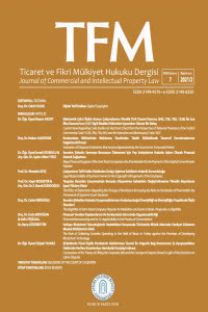FSEK’E GÖRE İLERİDE VÜCUDA GETİRİLECEK ESERLERLE İLGİLİ YAPILAN SÖZLEŞMELERİN İFASI VE SONUÇLARI HAKKINDA SİNEMA SEKTÖRÜ ÖZELİNDE BAZI DÜŞÜNCELER
5846 sayılı Fikir ve Sanat Eserleri Kanunu (FSEK) sistemi içinde henüz vücuda getirilmemiş eserler üzerindeki haklar üzerinde tasarruf işlemi batıl kabul edilmiştir. Ancak uygulamada, özellikle sinema sektöründe, henüz eser mevcut değilken, (genellikle yapımcı ile yönetmen ve oyuncular arasında), eser üzerindeki hakların devredilmiş olduğunu öngören sözleşmeler yapılmaktadır. Eser henüz mevcut değilken, eser üzerindeki hakları devreden sözleşme hükümlerinin, tahvil (conversion, Umdeutung) suretiyle ayakta tutulması ve bu tür tasarruf ihtiva eden sözleşme hükümlerinin, TBK m. 19/1 hükmü uyarınca FSEK m. 50/1 anlamında "tasarruf muamelelerine dair taahhüt" olarak nitelendirilmesi gerekir. Bu durumda, eser tamamlandıktan sonra eser üzerindeki mali hakların devrinin ya da mali hakları kullanma yetkisinin ikinci bir sözleşme ile sağlanması gerekirken, uygulamada bu yapılmamaktadır. Çoğunlukla tarafar (ya da bir taraf) edimlerini ifa ettikten sonra ihtilaf çıkmakta, aralarındaki sözleşmeleri "feshetmektedirler". Bu durumda, eser üzerinde hak iktisap ettiğini zanneden iyi niyetli üçüncü kişiler (örneğin sinema eserini yayınlayan televizyon kuruluşu) FSEK m. 54 uyarınca korunmamakta, hatta esere tecavüz iddiasıyla ref ve tazminat, FSEK m. 68 uyarınca rayiç bedelin üç katının ödenmesi talebiyle karşı karşı- ya kalmaktadır. Bu soruna çözüm bulmaya yönelik öğretideki görüşler FSEK sistematiği bakımından bir takım eksiklikler ihtiva etmektedir. Bizim bu çalışmada savunduğumuz görüşe göre, taahhüt işlemi olarak ayakta tutulabilen, eser henüz vücuda getirilmeden akdedilmiş olan, mali haklarla ilgili tasarrufi (mali hakların devri ya da kullanım yetkisinin bırakılmasında dair hükümler) ihtiva eden sözleşmelerde, esasen TBK m. 170-176 anlamında "geciktirici koşula" (taliki şarta) bağlı bir tasarruf işlemi söz konusu olup, şart eserin tamamlanmasıyla gerçekleşmiş olacak, tasarruf işlemi eserin tamamlandığı andan itibaren hüküm ifade edecek, sonuçlarını doğuracak ve eser üzerindeki (mali ya da kullanım yetkisi veren) haklar kendiliğinden devralana geçecektir. Bu durumda, eser ya da hak sahibi, devralandan mali hak ya da ruhsat devri mukabilinde kararlaştırılan bedeli talep edecektir.
CONSIDERATIONS ON PERFORMANCE AND RESULTS OF CONTRACTS REGARDING THE WORKS ORIGINATED IN THE FUTURE IN THE CINEMA INDUSTRY
An act of disposal concerning the rights on the work before the creation work is regarded as void within the system of Law No.5846 on the Intellectual and Artistic Works (Law No. 5846). Nonetheless, in practice, particularly in cinema industry, contracts are being concluded before the creation of work (between the producer and the director and actors in general) which stipulate the transfer of the rights on the work. Contracts which transfer the rights on the works should be considered as valid by means of conversion (tahvil, Umdeutung) and contract clauses including such disposal should be qualifed as “commitment regarding the act of disposal” in the meaning of Art. 50/1 of Law No.5846 as per Art. 19/1 of the Turkish Code of Obligations (TCO). In such a circumstance, although the transfer of economic rights or granting the authority to exercise the economic rights should be realised by means of a concluding a second contract, however, in practice, this is not the case. Mostly, a dispute arises afer the parties (or one of the parties) perform(s) and the parties “terminate” the contract between them. In such a case, third persons acting in good faith (such as the TV institution broadcasting the cinema work), who assume that they have acquired rights on the work, are not protected under Art. 54 of Law No.5846, and, even more, these third persons may be confronted by the claims of cease infringement and compensation, the payment of compensation of up to three times the current value under Art. 68 of Law No. 5846 due to the allegation of infringement. Doctrinal views aimed at fnding a solution to this problem are inadequate from certain aspects in terms of the systematics of the Law No. 5846. In this article, we argue that there is an act of disposal contingent to a “condition precedent” in the meaning of Art. 170-176 of the TCO in the contracts, which can be considered as valid as an act of disposal, which has been concluded before the creation of work and which include dispositionary clauses (transfer of economic rights or granting the authority to exercise such right) and the condition precedent shall be realised simultaneously with the completion of the work, the act of disposal shall enure, be efective and the rights (economic rights or the grant of the authority to exercise such rights) on the work shall be transferred by itself to the transferree as of the completion of work. In this case, the author or right holder shall be entitled to demand the agreed amount from the transferee in consideration of transfer of the economic right or the transfer of license.
___
- Arslanlı, Halil, Fikri Hukuk Dersleri – II, Fikir ve Sanat Eserleri, İstanbul 1954.
- Ateş, Mustafa, Fikir ve Sanat Eser Hukukunda Sinema Eseri ve Eser Sahipliği, Fikri Mülkiyet Hukuku Yıllığı 2009 (Editör: Tekin Memiş).
- Ayiter, Nuşin, Hukukta Fikir ve Sanat Ürünleri, 2. Bası, Ankara 1981.
- Bozbel, Savaş, Fikir ve Sanat Eserleri Hukuku, İstanbul 2012.
- Erel, Şafak N., Türk Fikir ve Sanat Eserleri Hukuku, 3. Baskı 2009.
- Eren, Fikret, Borçlar Hukuku Genel Hükümler, 14. Baskı, Ankara 2012.
- Oğuzman, Kemal/Öz, Turgut, Borçlar Hukuku Genel Hükümler, İstanbul 1995.
- Okutan Nilsson, Gül, “İleride Meydana Getirilecek Fikir ve Sanat Eserleri Üzerindeki Hakların Devri”, Legal Fikri ve Sınai Haklar Dergisi, 15/2008, 585-599.
- Öztan, Fırat, Fikir ve Sanat Eserleri Hukuku, Ankara 2008.
- Sirmen, Lale, Türk Özel Hukukunda Şart, Ankara 1992.
- Tekinalp, Ünal, Fikri Mülkiyet Hukuku, 5. Baskı, İstanbul.
- Tosun, Yalçın, Sinema Eserleri ve Eser Sahibin Hakları, 2. Baskı, İstanbul 2013.
- Tosun, Yalçın; Sinema Eserleri ve Eser Sahibinin Hakları, İstanbul 2009.
- Yavuz, Levent/Alıca, Türkay/Merdivan, Fethi, Fikir ve Sanat Eserleri Kanunu Yorumu, Ankara 2013.
- ISSN: 2149-4576
- Yayın Aralığı: 2
- Başlangıç: 2015
- Yayıncı: Ankara Yıldırım Beyazıt Üniversitesi Hukuk Fakültesi
Sayıdaki Diğer Makaleler
Limited Şirkette Genel Kurul Nisapları
LİMİTED ŞİRKETLERDE ORTAK SAYISININ SINIRLANDIRILMASI
Rechtsstreitigkeiten über Vinkulierte Namensaktien
ARBEITNEHMERERFINDERRECHT - BELEG FÜR DIE LEISTUNGSFÄHIGKEIT DEUTSCHER TARIFPARTNERSCHAFT?
Limited Şirketlerde Ortak Sayısının Sınırlandırılması
